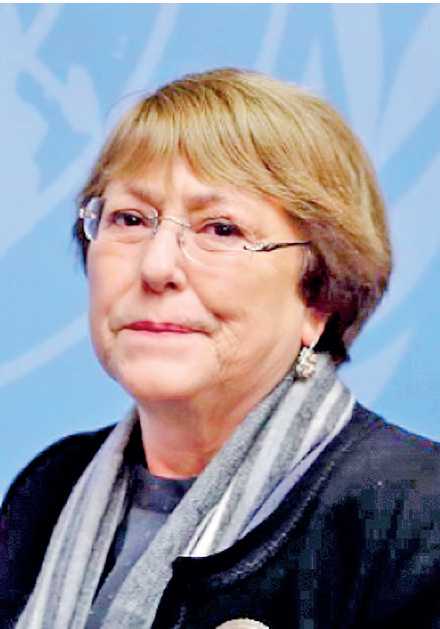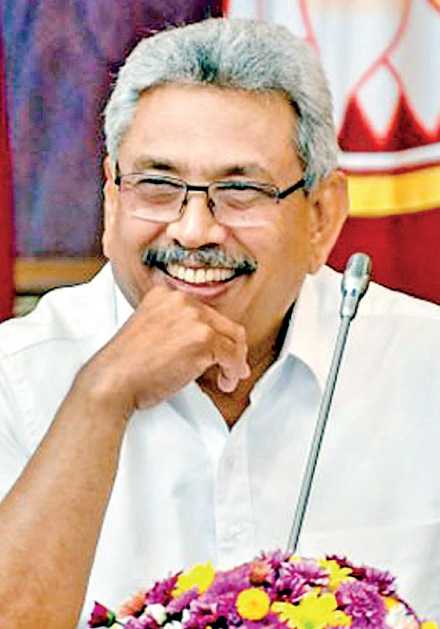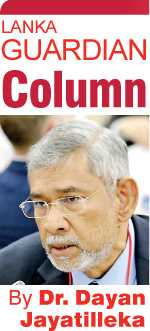Friday Feb 13, 2026
Friday Feb 13, 2026
Thursday, 28 January 2021 00:42 - - {{hitsCtrl.values.hits}}

UN Human Rights High Commissioner Michelle Bachelet’s Report is intended as a clarion call to save human rights in Sri Lanka from a clear and present danger, by any legal means necessary

So far, President Gotabaya Rajapaksa has primarily responded by appointing a three-man Commission to examine the reports of previous Commissions on the war and human rights
 The jagged asymmetry in the treatment of Sunil Ratnayake and Hejaaz Hizbullah is the most telling symptom and best illustration of the state of human rights and justice in Sri Lanka today, as well as of the character of the Gotabaya Rajapaksa regime.
The jagged asymmetry in the treatment of Sunil Ratnayake and Hejaaz Hizbullah is the most telling symptom and best illustration of the state of human rights and justice in Sri Lanka today, as well as of the character of the Gotabaya Rajapaksa regime.
Ex-Army Sergeant Ratnayake, a Sinhala-Buddhist, was serving a sentence upheld by highest courts for the crime of cutting the throat of a five-year-old Tamil child. He was pardoned by the President and welcomed on release by the current Secretary to the Ministry of Defence. Hizbullah, a young Muslim, a Supreme Court lawyer and British Chevening scholarship winner, has been in custody for nine months with allegations by the authorities (including Ministers) of involvement in the Easter Sunday bombings, but without being charged in a court of law.
Should anyone be shocked, surprised or indignant that a storm is brewing at the UN Human Rights Council in Geneva, the world’s Human Rights parliament?
Michelle Bachelet’s burden
UN Human Rights High Commissioner Michelle Bachelet’s report sets out the current Sri Lankan context as she perceives it:
“19. The following section highlights six of these broader trends: i) militarisation of civilian government functions; ii) reversal of Constitutional safeguards; iii) political obstruction of accountability for crimes and human rights violations; iv) majoritarian and exclusionary rhetoric; v) surveillance and obstruction of civil society and shrinking democratic space; and vi) new and exacerbated human rights concerns. The High Commissioner is concerned these represent important early warning indicators that require the Human Rights Council’s urgent attention.”
What is of cardinal significance is that every one of these trends describe a process unleashed by the administration of President Gotabaya Rajapaksa. Taken together, they constitute a grimly alarming ‘scan report’ of the country and its prospects. All of them were unnecessary and avoidable. They exist only by conscious choice, i.e., because of the ideology, model and decisions of the Gotabaya presidency. It is these six trends that lend credibility and constitute the launchpad for the Human Rights High Commissioner to “urge” alternative options for justice, aimed at the Sri Lankan armed forces and the conduct of the last war.
Latin America was for decades a laboratory of militarisation including under elected Presidents. In the latter cases, military rule has been more cumulative degenerative process than conclusive dramatic episode; more creeping cancer than coup d’état. Militarisation turned Latin America into a vast torture chamber, until after decades of horror, the continent was liberated by the protracted struggles of popular democratic forces.
Michelle Bachelet was part of that history, that story. A Latin American, a democrat, a socialist, an ex-president, an ex-defence minister, an ex-prisoner, a daughter of a tortured and martyred General (a democratic dissenter), and a woman, she knows what she’s talking about and tells it like it is.
Listed as the first of the disturbing trends she perceives as ‘early warning indicators’ is the Militarisation of Civilian Governmental Functions. Paragraphs 20 to 23 paint a convincing and alarming picture, revisited in Paragraph 54 in the all-important Conclusions and Recommendations:
“54. …an increased militarisation of the State. The Government has appointed active and former military personnel, including those credibly implicated in war crimes to key positions in the civilian administration, and created parallel task forces and commissions that encroach on civilian functions. Combined with the reversal of important institutional checks and balances on the executive by the 20th Constitutional Amendment, this trend threatens democratic gains.”
When she sees Sri Lanka over the past year, she perceives a military machine from which those who were responsible for terrible incidents in wartime have not been weeded-out over a decade later, being reactivated, empowered and handed increasing control over a long-standing democracy by an elected ex-military leader with questionable commitment to and controversial views, to say the least, on human rights.
Responsibility to prevent
Having brought her enormous political experience as a two-term President of an important country of the global South (as well as her considerable academic training) to bear in scrutinising the evidence of the recent structural changes and dynamics in Sri Lanka which are causing the rapid erosion of civilian control and democratic and civic space, she is alarmed by the prospect of renewed large-scale violence and a human rights catastrophe and is therefore sounding the alert, calling for a global effort of containment, deterrence and pre-emption/prevention of a bloodily tragic outcome.
The UN’s Human Rights Chief implies that in Sri Lanka today the dice is so heavily loaded by the 20th amendment, the dominance of the military and ex-military brass, the thrust of monk-and-military task forces, and the incumbent regime’s implacable hostility to checks-and-balances and accountability, that counterbalancing or deflecting the extremely dangerous domestic dynamics which have achieved accelerated momentum can only come—or must primarily come—from outside, from the ensemble of the UN system, the international system of states, the ICC, national judiciaries of UN member-states and global society.
The most crucial line in the text of the Report is literally the bottom-line of the Executive Summary: “She also urges Member States to pursue alternative international options for ensuring justice and reparations and support a dedicated capacity to advance these efforts.”
What exactly this means is spelled out in the Conclusions and Recommendations, Paragraph 59:
“59. Member states have a number of options to advance criminal accountability and provide measures of redress for victims. In addition to taking steps towards the referral of the situation in Sri Lanka to the International Criminal Court, Member States can actively pursue investigation and prosecution of international crimes committed by all parties in Sri Lanka before their own national courts, including under the principles of extraterritorial or universal jurisdiction.” This is reinforced in detail in Recommendations, Paragraph 61:
“The High Commissioner recommends that the Human Rights Council and Member States to:
…Support a dedicated capacity to collect and preserve evidence for future accountability processes, to advocate for victims and survivors, and to support relevant judicial proceedings in Member States with competent jurisdiction;
Cooperate with victims and their representatives to investigate and prosecute international crimes committed by all parties in Sri Lanka through judicial proceedings in domestic jurisdictions, including under the principles of extraterritorial or universal jurisdiction;
Explore possible targeted sanctions such as asset freezes and travel bans against credibly alleged perpetrators of grave human rights violations and abuses …”
Reading the past through the present and the future through the past and present, UN Human Rights High Commissioner Michelle Bachelet’s Report is intended as a clarion call to save human rights in Sri Lanka from a clear and present danger, by any legal means necessary. Her moral-ethical argument is not so much the Responsibility to Protect, but the Responsibility to Prevent.
Seriously?
So far, President Gotabaya Rajapaksa has primarily responded by appointing a three-man Commission to examine the reports of previous Commissions on the war and human rights. Several things about it are strange, even surreal. The first item of its mandate as stated in the gazette reads: “Find out whether preceding Commissions of Inquiry and Committees which have been appointed to investigate into human rights violations, have revealed any human rights violations, serious violations of the international humanitarian law and other such serious offences.”
That’s a matter of a weekend’s reading, surely—starting with the LLRC’s list of a decade ago. If those incidents had been independently investigated and prosecuted as LLRC Chairman, former Attorney-General and President Mahinda Rajapaksa’s confidante CR de Silva urged in the report, instead of facing obstructionism from high-flying hawks in the defence establishment, Sri Lanka would not be in this situation in Geneva today.
President Rajapaksa’s Commission will doubtless review (the late) Sir Desmond de Silva QC’s stellar report which I recall drew strenuous objections in a newspaper article by the author of ‘Gota’s War’, now our man in Geneva, because Sir Desmond had laid out several credible accountability options, while the Gotabaya camp’s doctrine was ‘zero-accountability’.
Self-undoing in Geneva
When the USSR fell (as he had forewarned), Fidel Castro said “it was suicide, not homicide”.
The Rajapaksas never understood that the legitimacy of our last war and the safety of the war-winning command structure—the political leadership, top security bureaucracy, the officer corps and the military as a whole—were inextricably linked with Geneva and had been successfully safeguarded in the second Sri Lankan victory of May 2009: the battle of Geneva.
Geneva was and is Sri Lanka’s vulnerable frontline, where those victories could begin to be reversed. The Rajapaksa Raj never bothered to inquire after and understand the secret of Sri Lanka’s internationally much-researched success in Geneva in May 2009: the acquisition through reasoned argument and persuasion, of the moral high-ground, and the construction on that basis of the broadest consensual coalition in Sri Lanka’s defence.
Nobody and nothing lost Sri Lanka that most vital strategic real-estate the moral high ground, and delegitimised Sri Lanka in Geneva and more generally in the international arena than has the regime of President Gotabaya Rajapaksa. But it didn’t happen overnight; it began 12 years ago, almost the morning after the military victory had been capped and space and time obtained for the Sri Lankan state by the diplomatic victory in May 2009. That space and time were criminally squandered.
Decapitating and dismantling Sri Lanka’s defences in Geneva—its winning team, preponderant coalition and strategic platform—a mere six weeks after the near two-thirds majority endorsement at the UNHRC special session, instead of consolidating and building on that success over the long-term chiefly because the Sinhala hawks in the state and government wished to disown and reverse President Mahinda Rajapaksa’s written commitments to India and the United Nations on the postwar political settlement, the Rajapaksas started down the road that has led them, the armed forces and the Sri Lankan state to a reckoning in Geneva in March 2021.
Driven by the defence establishment, the Rajapaksa regime shifted from the balanced, concentrically coalitional Geneva model of wartime, to the unilateralist post-conflict assertion of Sri Lankan exceptionalism. Closely linked to the defence establishment, Attorney-General Mohan Pieris, later the Chief Justice (infamous for his judicial doctrine “terrorists have no human rights” pronounced from the bench about the violent death of an un-convicted Tamil detainee) and currently Sri Lanka’s PR in New York, invoked Sri Lanka’s 2500-year civilisation as an argument in Geneva.
The postwar ‘exceptionalism’ defence of impunity met with crushing serial defeats in 2012, 2013 and 2014. Even in the face of the first two defeats, the hawks in the Rajapaksa regime opposed a reversion to Sri Lanka’s successful Geneva configuration when things might still have been retrievable.
It was the triple defeats of 2012, 2013 and 2014 that opened the door for the self-incriminating Geneva 2015 sellout by Prime Minister Ranil Wickremesinghe, just as in the previous decade, serial military defeats under President Kumaratunga had opened the door for Wickremesinghe’s CFA appeasement of Prabhakaran.
Altered target profile
The OHCHR Report cannot be spun as part of a western imperialist conspiracy to punish a nationalist regime of the Global South.
Firstly, Michelle Bachelet, the former Socialist President of Chile and former political figure in the resistance against the Pinochet military junta, is hardly a western imperialist puppet.
Secondly, no UN Human Rights High Commissioner ever made such drastic recommendations during the tenure of President Mahinda Rajapaksa who stood up to external powers far more directly than his sibling-successor has done and is doing while prosecuting the war through to its decisive end.
Thirdly, though the Secretary to the Ministry of External Affairs, Admiral Colombage just declared that “When you look at the composition of it [the UNHRC], it is global Political North dominated” (Daily Mirror, Jan 25th 2021), that’s Trumpian ‘fake news’. Whatever is meant by ‘political North’ and ‘political South’, the truth is that the Institution-Building (IB) package, i.e., the Constitution or foundational text of the UNHRC, embedded ‘equitable geographic representation’ ensuring that 34 of the 47 member states are from the Asia-Pacific (13), Africa (13) and Latin America and the Caribbean (8), which means that the North is in a structural minority (13).
I was an active participant in the negotiations to overcome a deadlock as a Vice-President of the UNHRC when the IB package was gavelled through in 2007 by Mexico’s Ambassador Luis Alfonso de Alba (whose letter of thanks I still have).
It is the changed (target) profile of the Sri Lankan state and its policies and practices that have caused the escalation in Geneva, because these have set off many early warning alarms. That target profile was changed and those policies introduced or persisted in by President Gotabaya Rajapaksa. This is how one such policy, the burial/cremation issue, is seen by the UN Special Rapporteurs, and the conclusion arrived at about Sri Lankan trends under the Gotabaya dispensation:
‘… “The imposition of cremation as the only option for handling the bodies confirmed or suspected of COVID-19 amounts to a human rights violation. There has been no established medical or scientific evidence in Sri Lanka or other countries that burial of dead bodies leads to increased risk of spreading communicable diseases such as COVID-19,” said the experts.’ (Daily FT)
‘… “We deplore the implementation of such public health decisions based on discrimination, aggressive nationalism and ethnocentrism amounting to persecution of Muslims and other minorities in the country” the experts said. “Such hostility against the minorities exacerbates existing prejudices, intercommunal tensions, and religious intolerance, sowing fear and distrust while inciting further hatred and violence”, they added…’ (UN News)
This description is a damning indictment never deployed about Sri Lanka even in wartime. President Mahinda Rajapaksa was never accused by UN agencies or officials of “aggressive nationalism and ethnocentrism” or “persecution of Muslims and other minorities in the country”. That is what differentiates the military-studded ultranationalist regime of Gotabaya Rajapaksa from that of his war-winning elder brother.
Regime vs. State
There’s no Great Wall of China to hide behind in Geneva. Though the war record is mainly—though neither uncritically nor unconditionally—defensible, the human rights record and the behaviour and trajectory of the Gotabaya regime are not.
It is the profile, conduct and character of the regime that is contaminating any credible defence in Geneva and globally, of the Sri Lankan State, its armed forces and its legitimate war (2006-2009).
President Gotabaya Rajapaksa has made Sri Lanka utterly vulnerable to its critics and foes by distorting our ‘country profile’, neutralising our traditional defensive advantage of being Asia’s oldest democracy; a proudly civilian one.
The President has counter-productively over-exposed the wartime command-and-control structure, including and especially every single one of his high-profile military/ex-military appointees across the state spectrum, as targets worldwide, vulnerable to asset-freezes, sanctions, and far worse, the global net of prosecutions that UN High Commissioner Bachelet “urges” through national courts in all UN member states, under the doctrine of extraterritorial and universal jurisdiction.
[The writer was Sri Lanka’s Ambassador/Permanent Representative to the UN Geneva 2007-2009 and a Vice-President of the UN Human Rights Council 2007-2008.]